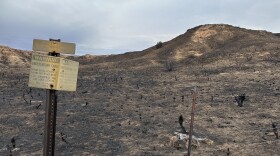This report is part of the TPR series Planes, Trains and Automobiles: Evading the Texas Abortion Ban. The series is about Texans forced to travel to other states for reproductive medical care and the people who help them.
Since the U.S. Supreme Court overturned Roe v. Wade, Texas made obtaining an abortion virtually impossible. For a state as large as Texas, getting to where abortion is legal can be the challenge.
But volunteer pilots are giving flight to women in need of abortion care.
Bart — not his real name — rolls back the hanger door where his plane sits.
"This is the girl," he said. “So for confidentiality reasons this is Susan.”
TPR also needed to change his pet name for his airplane because Bart and Susan are partners in an active underground effort — flying people to access abortion care when they live in states where abortions are outlawed.
Susan is a single engine tight four-seater, built more than 60 years ago.
“But it’s got the range to make it to a couple of states out of here, and it’s pretty fast," he said.

Bart is able to ferry someone in need of an abortion to another state where abortion is legal without too much time and trouble. All on the down-low.
Even though what he’s doing is completely legal, he asked that his identity be kept secret due to concerns of harassment from zealous anti-abortion activists.
“You know, there's a group of people out there that are really gung ho to get on computers and dox people,” he said.
Bart is one of hundreds of volunteers with Elevated Access — an organization that coordinates small plane pilots with people in need of an abortion. The match-ups are done online. Elevated Access embraces anonymity. The pilots don’t even know the names of their passengers.
“I don't know what they were going up there for. I didn't ask, they didn't tell," he said. "It was just a coordinated request to go get somebody some medical care."
Even the founder and executive director of Elevated Access keeps his real identity hidden. He asked to use the name Mike. And he said privacy and secrecy is baked into the process of connecting people who need abortions with pilots who want to help.
“If there was a district attorney or attorney general that decided to try to come after us or one of our pilots, we have as much plausible deniability as possible," he said. "We know that there are activist judges out there.”
Elevated Access started a year and a half ago, and so far they’ve flown more than 600 missions for more than 800 people around the country. Mike said he expects that to balloon to more than 1,000 missions in 2024. That’s because Elevated Access is still growing but also because organizations that used to buy airline tickets for women seeking out of state abortions are seeing a drop off in their funding.
“A lot of organizations have seen funding slow down, and so they're coming to us perhaps more often to help fill that gap when they're trying to get somebody from A to B," he said.
Currently there is no way to prevent people from traveling from one state to another to access abortion care but Mike said he expects more efforts to change that.
“Until one of these states gets into interstate restrictions then, you know, we'll, we'll have to evaluate that in that situation,” he said.

There are already efforts in Texas to make local airports off limits to these flights, headed by Mark Lee Dickson of Operation Rescue East Texas. He helped pass ordinances that prohibited the use of local roads and runways for anyone leaving Texas for an abortion.
“All we're saying in this ordinance is that anyone who would assist in that effort, we see that as aiding and abetting an abortion, and we're going to stand against it," Dickson said.
It’s unlikely that these ordinances would survive a court challenge but Mike said the abortion support community is taking a wait and see approach.
“We certainly monitor the different laws and regulations that different groups are trying to pass, whether they're constitutional or not," he said. "It's a case by case basis in terms of whether it affects our operations or not.”
Mike said the future of abortion rights depends on the outcome of the November election. Republican victories could make abortion illegal nationwide. But he’s focused on the short term and right now. The skies are where freedom still exists.
Copyright 2023 Texas Public Radio. To see more, visit Texas Public Radio. 9(MDA4OTAxNzAzMDEzMjc0MTc2MzA5ZDZlMw004))









